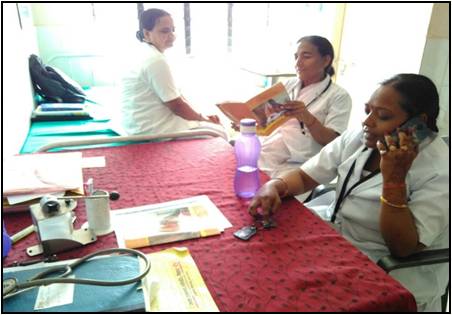HEALTH

One visit to the Nurses duty station at the Public Health Centre (PHC) in Sarairanjan, Samastipur reveals the transformation that has gradually started bourgeoning in among the stationed staff and systemic changes thereof.
This transformation is not an over-night phenomena but a result of meticulously planned and designed outlay to bring in intrinsic change in knowledge, attitude, behaviour and practices of nursing staff of the facility via ‘Amanat’ training or Apatkalin Matritva Evam Navjat Tatparta-Buniyadi karyakram (Emergency Maternal and Child Assiduity-Foundation Program). This includes practice and recording in tandem as real life cases are created via comprehensive simulation exercises.
Poised to develop as a CHC in the near future, the current centre demanded a substantial improvement in existing staff’s skillset, since there is dearth of skilled staff willing to be stationed in remote areas. The patient load necessitates complete and timely recoding to tend to other patients with equanimity. Instilling faith in government-run health institutions is another apprehension mandating quality assurance. Here, the maintenance and upgradation of documents (registers) was found to play an important aspect not only to record, manage, plan and synchronise daily scheduled activities (with scope for handling emergency obligations), but also combat any negative legal repercussions emanating due to medical care. Good record keeping was also vital in dealing with patients who are abusive, don’t follow advice, or present the same complaints without improvement. This would also help in providing quick responses, in case an RTI is filed.
Recognising the importance of this parameter, CARE India pitched in with the customised Amanat training module which not only explains the medical skills/protocol part but also elaborates on the processes visually, in simplistic manner for easy conduct and adoption, equally delineating the importance of recording.
The medical recording process starts from time of admission to discharge/referral and thus facilitates the ability of the physician and other healthcare professionals to evaluate and plan the veteran’s immediate treatment, and to monitor his/her healthcare over time. It also facilitates communication and continuity of care among physicians and other healthcare professionals involved in the patient’s care with minimum wastage of time which can otherwise be rationalised for investing in critical health care interventions. It also helps in recalibrating oneself for adherence to prescribed government norms and procedures and minimising loss of revenue expended for healthcare due to incorrect diagnosis and treatment. It helps to maintain the integrity of the Health Management Information System (HMIS), which crystallises into regional, state and national data sets. This micro-picture when scrutinised at macro level corroborates research findings and influences policy level decisions.
Understanding this, Sarairanjan PHC revamped its entire record keeping system. This organised and updated duty station, complete with duty roster and clinical topic of discussion for the week, greets one and commands the solemnity of business. The documentation part (record keeping) which was once considered an unnecessary burden required only for formalities, is now a norm required for logical planning and execution of duties. It is now envisioned as a key activity to record, analyse, track and monitor patients in a systematic manner. It is from these records that a weekly clinical discussion is conducted on a medical issue and consequent field visits are planned, which couldn’t be visualised a few months earlier.
One of the Nurses at the Centre, Meena Kumari, is a grade-A nurse from past 9 years is thankful for the Amanat training, through which she can now effectively identify and manage delivery related complications. Complementing her role, this module also explains in details on how appropriate record keeping should be done so as to observe the patient correctly, provide the correct diagnosis and treatment and maintain information.
Nurses Duty station at Sarairanjan PHC, Samastipur
“Good medical documentation promotes patients’ and physicians’ best interests for different reasons. Recording all relevant information of a patient’s care helps practitioners monitor what’s been done, and minimizes the risk of errors creeping into the treatment process. Careful attention to detail also reduces the likelihood of patients returning for additional treatment. It is a tangible proof especially in accounting for cases of maternal and child death audit reporting,” she said.
“It also forms the basis of selection of relevant technical topic of discussion in regular ANM and ASHA meetings which were earlier crippled with humdrum monologue. The module speaks of maintaining the integrity of data via recording, in various prescribed registers and formats leading to increased accuracy, relevance, completeness, timeliness and confidentiality. Me and my colleagues can now confidently and guiltlessly attest to the fact of eliminating data discrepancy and accomplishing work with a professional touch,” she added.




